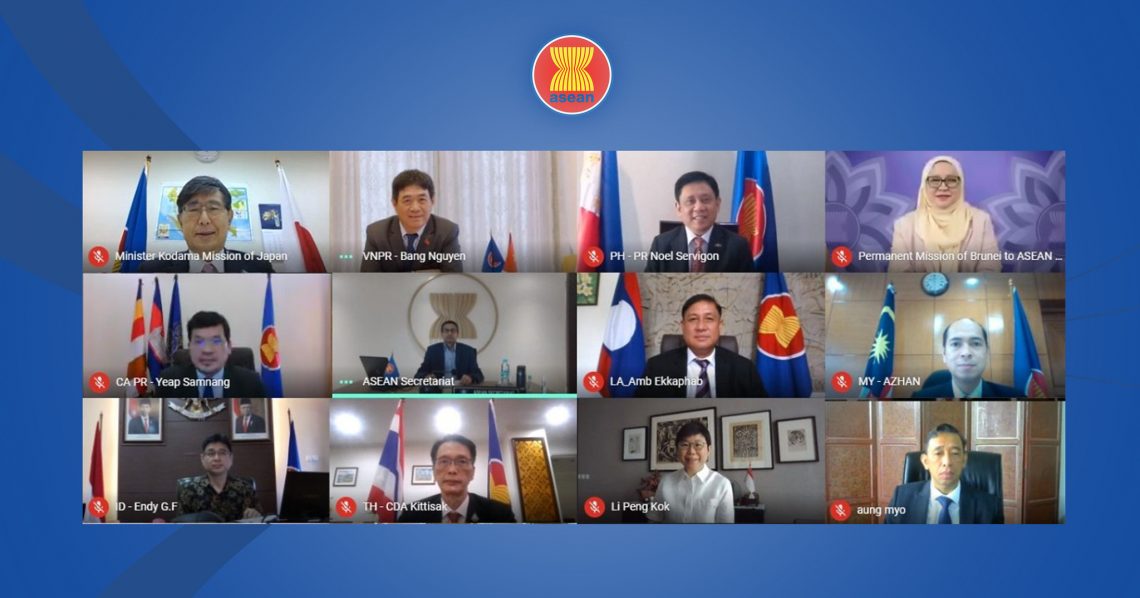JAKARTA, 23 March 2020– The 15th ASEAN-Japan Joint Cooperation Committee Meeting took place virtually today, underscoring the commitment of both sides to further strengthen the ASEAN-Japan partnership.
The meeting welcomed the substantive progress in ASEAN-Japan cooperation through the implementation of activities under the Implementation Plan of the 2013 Vision Statement on ASEAN-Japan Friendship and Cooperation. Approximately 97% of the action lines under the Plan have been addressed.
Both sides agreed to continue promoting cooperation in areas of common interests, including trade and investment, disaster management, sustainable development, smart cities, cybersecurity, connectivity, and people-to-people exchanges. They also stressed the need for close cooperation for the regional post-pandemic recovery, including through the implementation of the ASEAN-Japan Economic Resilience Action Plan.
ASEAN appreciated Japan’s support towards the establishment of the ASEAN Centre for Public Health Emergencies and Emerging Diseases Centre and contribution to the COVID-19 ASEAN Response Fund. Preparations are being made for the establishment and operation of the Centre which aims to enhance ASEAN’s capacity and resilience to future public health emergencies.
The two sides exchanged views on development in ASEAN and Japan. Japan highlighted the priority to implement the Joint Statement of the 23rd ASEAN-Japan Summit on Cooperation on the ASEAN Outlook on the Indo-Pacific (AOIP), through conducting practical cooperation in the key areas of the AOIP.
ASEAN also acknowledged Japan’s continued support for ASEAN’s development including its contribution to the Japan-ASEAN Integration Fund. Both sides also welcomed the progress made in the implementation of the ASEAN-Japan Technical Cooperation Agreement, with more activities to be conducted this year.
The meeting was co-chaired by the Permanent Representative of Viet Nam to ASEAN, Nguyen Hai Bang, and Ambassador of Japan to ASEAN, Akira Chiba, and attended by members of the Committee of the Permanent Representatives to ASEAN and representative of the ASEAN Secretariat.
- ABOUT ASEANThe Association of Southeast Asian Nations, or ASEAN, was established on 8 August 1967 in Bangkok, Thailand, with the signing of the ASEAN Declaration (Bangkok Declaration) by the Founding Fathers of ASEAN: Indonesia, Malaysia, Philippines, Singapore and Thailand. Brunei Darussalam joined ASEAN on 7 January 1984, followed by Viet Nam on 28 July 1995, Lao PDR and Myanmar on 23 July 1997, and Cambodia on 30 April 1999, making up what is today the ten Member States of ASEAN.Menu
- WHAT WE DO
ASEAN organs always strive to achieve ASEAN’s goals and objectives, the Secretary-General of ASEAN and the ASEAN Secretariat shall be functioned as coordinating Secretariat to help facilitate effective decision-making withing and amongst ASEAN bodies. In addition, each Member State shall appoint a Permanent Representative to liaise with Secretary-General of ASEAN and the ASEAN Secretariat
Menu - WHO WE WORK WITH
ASEAN shall develop friendly relations and mutually beneficial dialogues, cooperation and partnerships with countries and sub-regional, regional and international organisations and institutions. This includes external partners, ASEAN entities, human rights bodies, non-ASEAN Member States Ambassadors to ASEAN, ASEAN committees in third countries and international organisations, as well as international / regional organisations.
Menu - OUR COMMUNITIES
The rodmap for an ASEAN Community (2009-2015) was declared by the leaders in 2009. The ASEAN Community, anchored on three community pillars: Political-Security Community, Economic Community, Socio-Cultural Community was launched in 2015. The ASEAN 2025: Forging Ahead Together was introduced in 2015 as a Post-2015 Vision. It comprises the ASEAN Community Vision 2025, the ASEAN Political-Security Community Blueprint 2025, the ASEAN Economic Community Blueprint 2025 and the ASEAN Socio-Cultural Community Blueprint 2025
Menu - SITEMAP





